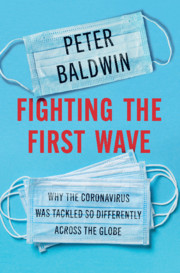Book contents
- Fighting the First Wave
- Also by Peter Baldwin
- Fighting the First Wave
- Copyright page
- Dedication
- Contents
- Introduction: One Threat, Many Responses
- Chapter 1 Science, Politics, and History
- Chapter 2 New Dogs, Old Tricks
- Chapter 3 The Politics of Prevention
- Chapter 4 What Was Done?
- Chapter 5 Why the Preventive Playing Field Was Not Level
- Chapter 6 Where and Why Science Mattered
- Chapter 7 From State to Citizen
- Chapter 8 Who Is Responsible for Our Health?
- Chapter 9 Difficult Decisions in Hard Times
- Conclusion: Public Health and Public Goods
- Acknowledgments
- Notes
- Index
Chapter 6 - Where and Why Science Mattered
Traditional Chinese Medicine, Herd Immunity, Asymptomatic Carriers, Superspreading, and Masks
Published online by Cambridge University Press: 12 March 2021
- Fighting the First Wave
- Also by Peter Baldwin
- Fighting the First Wave
- Copyright page
- Dedication
- Contents
- Introduction: One Threat, Many Responses
- Chapter 1 Science, Politics, and History
- Chapter 2 New Dogs, Old Tricks
- Chapter 3 The Politics of Prevention
- Chapter 4 What Was Done?
- Chapter 5 Why the Preventive Playing Field Was Not Level
- Chapter 6 Where and Why Science Mattered
- Chapter 7 From State to Citizen
- Chapter 8 Who Is Responsible for Our Health?
- Chapter 9 Difficult Decisions in Hard Times
- Conclusion: Public Health and Public Goods
- Acknowledgments
- Notes
- Index
Summary
The scientific understanding of the disease was broadly the same the world over. But in some instances, scientific disagreements did have repercussions for the preventive tactics chosen. The authorities there accepted Traditional Chinese Medicine as a tool against Covid-19 in a way not true elsewhere. Herd immunity was the belief that if the disease were allowed to run through the population, killing many in the process, the outcome would be broad immunity among the survivors. That would bring the pandemic to a halt. Some nations seem to have toyed with this strategy, though the increased mortality it would cause was politically hard to stomach. Asymptomatic carriers were the infected who spread the disease even though they did not themselves suffer any apparent ill consequences. They could be identified only through widespread testing and posed dangers to others since no one knew who was an asymptomatic carrier. Some people and places were thought to be superspreaders, conveying the disease to many more people than would ordinarily be true. If they could be identified, the payoff in preventive terms was great. Masks, finally, were an initially controversial means of prevention that gradually gained recognition and acceptance. Nonetheless, their use remained a suspect technique, disregarded by many.
Information
- Type
- Chapter
- Information
- Fighting the First WaveWhy the Coronavirus Was Tackled So Differently Across the Globe, pp. 138 - 169Publisher: Cambridge University PressPrint publication year: 2021
